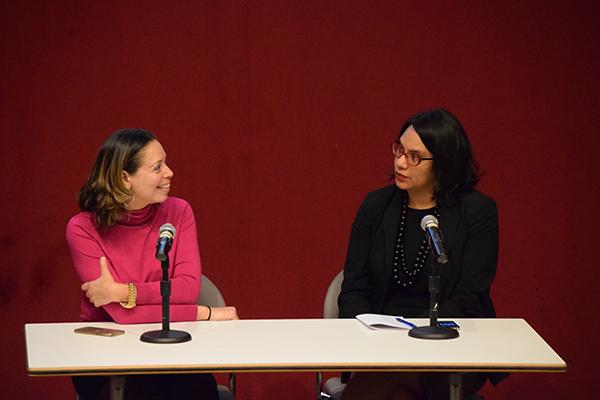Immigration experts tackle ‘Ellis’ immigration in film

Panelists Shirley Leyro (left) and Isabel Martinez (right), from John Jay College of Criminal Justice, discuss immigration issues after screening of JR’s new film Ellis starring Robert De Niro.
November 16, 2015
French artist JR’s latest film venture, “Ellis,” presents yet another perspective into the complex issue of immigration. NYU Program Board held a screening of the short film for students along with a panel on Nov. 9 with immigration experts. Isabel Martinez and Shirley Leyro, professors at John Jay College of Criminal Justice, spoke to the relevance of this depiction of Ellis Island to the issues facing the United States today.
“Ellis” stars Robert DeNiro as a man who walks the abandoned rooms of Ellis Island’s hospital wing, recounting the dashed hopes and dreams of those who were barred entry after making the treacherous journey across the world to get their share of the American Dream. The film displaces the romantic notion of Ellis Island as the place of new beginnings and hope as it portrays the other side of the island’s history that is so often forgotten.
While the movie re-analyzes the past, the timing of the release raises questions about the way immigration issues are handled in the present day. Martinez is a specialist in the immigration of unaccompanied minors and Leyro specializes in immigrants’ fears of deportation. They both took this opportunity to communicate the problems and complexities they see in immigration and the United States as a whole.
“The reasons why people migrate have always been the same,” Leyro said. “What’s unique to today is the level of enforcement we have been putting on the immigrant population and the mass deportation we have done.” She went on to explain that anti-immigrant sentiments have always been present, even in the times of Ellis Island, but the issue today is that deportation was never used as solution to this problem until the mid-1990s.
“Any Central American refugees who have criminal records were deported back to Central America,” Martinez said. “Basically what that created was a transnational criminal organization network.” This continual growth of large criminal organizations has given way to the rise of violence in these countries.
The panelists stressed how Ellis Island is usually associated with European immigration and is romanticized, but the Mexico-U.S. border is not looked at the same way. Though Mexican immigrants often flee from the same struggles and for the same dreams, they are vilified, unlike those from European countries and the northern border, who are
also undocumented.
“Immigrants are not here to stay in the United States, but to come here for a short amount of time, and earn enough money so they can fulfill the dreams they have in their home country,” said Martinez.
She described how the system used to be circular. Immigrants could come in, work and take the money home, but heavy militarization has made it difficult to come in and out rather than stay in the country undocumented.
Immigration has always been a complex issue, but the eye-opening “Ellis” panel suggests current criminalization and deportation tactics have created more problems than solutions.
“Ellis” premiered at the New Yorker Festival on Oct. 25. and screened at Kimmel on Nov. 9.
A version of this article appeared in the Nov. 16 print edition. Email Anubhuti Kumar at [email protected].











































































































































